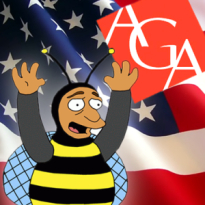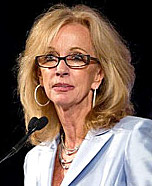 Tuesday was American Gaming Association (AGA) president Frank Fahrenkopf’s moment to shine at the Global Gaming Expo (G2E) in Las Vegas. Fahrenkopf made plain his organization’s intent to press US federal politicians hard to pass online poker legislation this year that favors US land-based casino companies. Fahrenkopf claims he and his AGA minions are “spending a lot of time on the hill with members of Congress and their staff and [the AGA’s ‘wild west’ propaganda video] has been really well accepted … We’re perhaps and I use the word perhaps closer to federal legislation than we’ve ever been and there’s buzz in Washington about the need for action.”
Tuesday was American Gaming Association (AGA) president Frank Fahrenkopf’s moment to shine at the Global Gaming Expo (G2E) in Las Vegas. Fahrenkopf made plain his organization’s intent to press US federal politicians hard to pass online poker legislation this year that favors US land-based casino companies. Fahrenkopf claims he and his AGA minions are “spending a lot of time on the hill with members of Congress and their staff and [the AGA’s ‘wild west’ propaganda video] has been really well accepted … We’re perhaps and I use the word perhaps closer to federal legislation than we’ve ever been and there’s buzz in Washington about the need for action.”
Fahrenkopf believes the nearly 100 new members of Congress – a good chunk of them Tea Party types with supposedly libertarian streaks — are key to passing a federal bill. As for which bill these political noobs will be asked to support, Fahrenkopf said only that Congressional enthusiasm for the most recent online poker bill introduced by Rep. Joe Barton (R-Tx) had waned, and the AGA is waiting for an as-yet unnamed sponsor to introduce the AGA’s preferred option.

Assisting the AGA in convincing Congress that online poker can be made safe and secure are the ex-law enforcement luminaries of FairPlayUSA, the grassroots/Astroturf lobby group funded by Caesars and MGM Resorts. While echoing the “we’ll keep poker cooties off your kids” meme, MGM’s Alan Feldman was a little more blunt about his company’s desire to shuffle up and deal online. “There’s an opportunity for businesses here to reach out to new customers. There’s an opportunity for us to grow our regulatory base and all of that leads to new tax revenues.” (Whoops… Don’t say the T-word around the Taxed Enough Already Party types!)
Taxation was a key point of debate when the G2E online gaming panel got around to discussing the possible nuts and bolts of future legislation. Proposals ranged from a tax on deposits to a tax on withdrawals; although, as was pointed out, the deposit tax could produce a scenario in which a player deposits then withdraws without wagering a penny, but the operator would be taxed regardless. D’oh? Concerns were also raised that once the revenue started flowing into government coffers, the temptation to increase the tax rate would prove too great for lawmakers to resist.
Of course, the land-based casino world isn’t a monolith, and a few operators still fear that readily available online poker could turn their casinos into ghost towns, even though industry notables say poppycock. (As this video of Calvin Ayre will attest, he has long believed that the two sectors complement, rather than cannibalize each other.) Vahe Baloulian of eGaming Partners Inc. maintains that online poker actually feeds live poker rooms by allowing new players the option of learning the game without risking any money via .net sites. “We see it in Europe, where free play is used to teach them the game and then invite them to the casino.” Baloulian also believes (as Calvin also stated in that same video) that retaining casino clients would ultimately come down to companies who worked hard to build strong brand recognition.